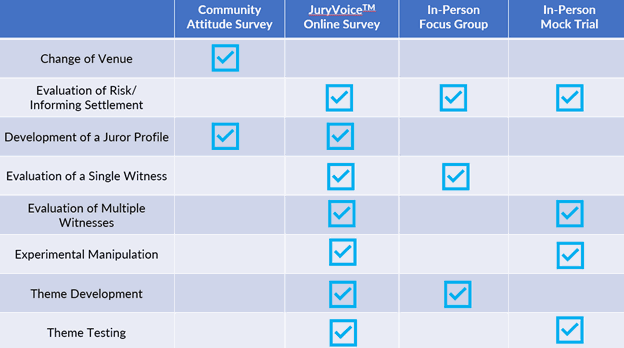Defense strategy during the pandemic
The U.S. Census Bureau estimates 37% of Americans experienced symptoms of anxiety or depression during mid-December 2020 (U.S. Census Bureau, Household Pulse Survey, 2020). Defense attorneys returning to the courthouse for trials in coming months will face a jury venire composed of many people who have experienced recent mental, financial, and possibly also physical distress due to the pandemic.
These recent stressors will make for an uphill battle on the side of the defense. Prior to 2020, Courtroom Sciences’ Litigation Consultants advised defense counsel that jurors who have experienced recent stressful life events are more likely to side with a complainant in a lawsuit than jurors who have not (Speckart, 2000). At the same time, no one had studied the effect of widespread economic strain combined with fears and anxiety related to health concerns and restraints on social interaction of the level created by the pandemic or how these stressors would impact juror decision-making.
To be clear, this is not to say that individuals who typically would side with the defense will suddenly favor plaintiffs. Instead, jurors who were more likely to favor the plaintiff prior to COVID-19 are more extreme in their views and less likely to compromise with their defense-favoring peers. In fact, 76% of jurors surveyed during the pandemic reported that they were “stronger in their prior attitudes and beliefs” during the pandemic.
It is important to note that jurors’ perceptions of “corporations” as a whole has become generally more negative, though some specific industries are viewed more positively during the pandemic. For example, jurors have reported feeling more positively toward trucking companies, hospitals, and small, local businesses. Importantly, though, while jurors report having more positive feelings toward certain industries, in mock trial research held during the pandemic, these self-reported positive attitudes have had little to no effect on juror verdicts. In other words, if you believe jurors will not find against your client because you represent a small, mom-and-pop restaurant during a pandemic that has taken its toll on the restaurant industry, think again.
Even better than just “thinking again,” test your case. If you focus grouped or mock tried an important case prior to March of 2020, and the case is yet to go to trial, it is ideal to test the case again. This is not the time for defense attorneys and companies they represent to wait around for courts to open or vaccines to be distributed. This time should be used for evaluating your matters and strategizing. If you are wondering whether stressed jurors will have the mental energy to grasp your complex defense arguments, whether COVID-19 will change jurors’ views of the company you represent, or what damages number you can suggest to effectively bring jurors down from the outrageously high number that the plaintiff requests, these questions can be answered scientifically before trial.
Online jury research has been utilized successfully well prior to COVID-19. With an online study, both sides of a matter are presented to mock jurors just as they would be in a live mock trial or focus group, and the mock jurors attend interactive sessions virtually. This allows counsel and their clients to evaluate case themes, exhibits and witnesses, and develop a case-specific juror profile for jury selection purposes without needing to leave the office (even if your home is your office these days).
The online format is ideal during the pandemic as there are, in most venues across the United States, significant differences between the mock jurors who would agree to participate in an in-person study and those who would only agree to participate online during COVID-19. Generally, limiting your sample to only those people who have no concern about participating in an in-person study is likely to exclude some plaintiff-leaning mock jurors. For the defense attorney hoping to learn about her case, an in-person study could give her a false read and cause her to believe she has a better chance in court than she actually does. Then, if the trial does not move forward until there is a vaccine and the plaintiff-oriented jurors who were concerned about venturing into the courthouse are no longer as apprehensive, the outcome of the trial may be quite different from what was found in the pre-trial jury research. Thus, with an online study, the defense is able to evaluate more accurately how jurors will decide the case by including a more representative sample.
Additionally, online jury research provides the benefit of allowing for cost-efficient experimental designs. An experimental design in this context is any study that tests different conditions. For example, a defense attorney may be interested in whether admitting to negligence and contesting damages, may impact the jurors’ damage numbers. This could be tested with an in-person study by holding two mock trials, one who hears the defense contest negligence and the other who hears the defense admit negligence. With an in-person project, this would typically require at least a two-day mock trial with two separate jury panels. In an online study, the same question can be more efficiently assessed by including a larger sample of mock jurors and simply presenting different videos to one panel (for the “admitted negligence” condition) than to the other panel (for the “contested negligence” condition). Because online mock jurors do not need to fit into a focus facility or hotel meeting space, a much larger sample can easily participate without adding significant cost to the project.

Cited
G. Speckart, "Identifying the Plaintiff Juror," For the Defense, September 2000, vol. 42, No. 9
National Center for Health Statistics, Anxiety and Depression Household Pulse Survey. Accessed at Mental Health - Household Pulse Survey - COVID-19 (cdc.gov)